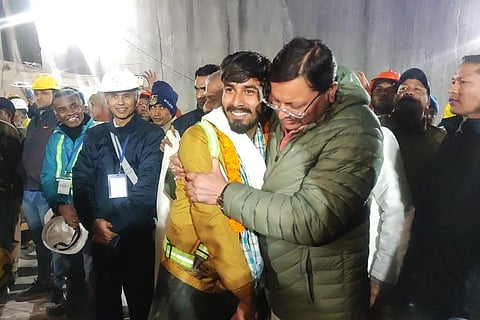Uttarkashi: 41 rescued workers emerge dazed, smiling after 17 days trapped in collapsed road tunnel
UTTARKASHI: Forty-one construction workers emerged dazed and smiling late Tuesday from a collapsed tunnel where they had been stranded the last 17 days — a happy ending to an ordeal that had gripped the country and involved a massive rescue operation that overcame several setbacks.
Locals, relatives and government officials erupted in joy, set off firecrackers and shouted “Bharat Mata ki Jai" (“Long live mother India") as happy workers walked out after receiving a brief checkup by doctors. Officials hung garlands around their necks as the crowd cheered.
Nitin Gadkari, Minister of Road Transport and Highways, said in a video posted on the social media platform X that he was “completely relieved and happy” that all of the workers were rescued from the Silkyara Tunnel in Uttarkashi, a town in the northern state of Uttarakhand.
“This was a well-coordinated effort by multiple agencies, marking one of the most significant rescue operations in recent years,” Gadkari said.
No one was seriously injured or killed when a landslide caused a section of the 4.5-kilometer (2.8-mile) tunnel about 200 meters (220 yards) from the entrance to collapse early on the morning of November 12 in Silkyara. The workers were finishing their shifts and many were likely looking forward to celebrating Diwali that day.
The workers had light in the collapsed tunnel, and since early in their ordeal, they were provided with food, water and oxygen through pipes. More than a dozen doctors, including psychiatrists, were also at the site monitoring their health.
Officials said all 41 workers made it through the ordeal in good health. Before emerging to the cameras and crowds and being whisked away in ambulances, each was given a checkup at a makeshift medical camp in the tunnel entrance.
The rescue was expected to be straightforward and last only a few days, but a series of setbacks led to its expansion and to the workers being trapped for more than two weeks.
During the final stretch, military engineers and skilled miners dug the final section overnight Monday into Tuesday by hand. They used a so-called "rat-hole" technique, a three-person team working at the rock face inside a metal pipe, just wide enough for someone to squeeze through. Rat-hole mining involves digging of narrow tunnels, usually 3-4 feet high, for workers to enter and extract coal. The horizontal tunnels are often termed “rat holes”, as each just about fits one person.
Rescuers had to resort to digging by hand after the machine they had been using broke down Friday. The machine had bored through about 47 meters (51 yards) of the roughly 57-60 meters (62-66 yards) needed to reach the workers.
The workers were extracted one by one on a wheeled stretcher that was pulled through a roughly meter-wide (yard-wide) tunnel of welded pipes that crews had pushed through the dug-out space.
WATCH:
Devender, a rescuer who only gave his first name, told NDTV that “the trapped workers were overjoyed when they spotted us in the tunnel. Some rushed toward me and hugged me.”
Most of the workers were migrant labourers from throughout the country, and many of their families travelled to the site and camped out for days in hopes of seeing them rescued.
Prime Minister Narendra Modi spoke to some of the rescued workers over the phone and asked about their wellbeing, PTI reported. He said their courage and patience were an inspiration to everyone, and he wished them good health.
He also praised the many people who took part in the rescue.
“Everyone involved in the mission has created an amazing example of humanity and teamwork,” Modi said.
Experts flag concerns
The tunnel the workers were building was designed as part of the Chardham all-weather road, which will connect various Hindu pilgrimage sites. Some experts say the project, a flagship initiative of the central government, will exacerbate fragile conditions in the upper Himalayas, where several towns are built atop landslide debris.
Large numbers of pilgrims and tourists visit Uttarakhand’s many Hindu temples, with the number increasing over the years because of the continued construction of buildings and roadways.
Families of workers celebrate
"We are thankful to God and the rescuers who worked hard to save them," Naiyer Ahmad told AFP, whose younger brother Sabah Ahmad was among the trapped workers, and who had been camping out in bitterly cold temperatures at the site for over two weeks.
"We are extremely happy, no words can explain it," said Musarrat Jahan, the wife of one rescued worker Sabah Ahmad told AFP by phone from Bihar state, where she had been waiting desperately for news.
"Not only my husband got a new life, we also got a new life. We will never forget it".
Guriya Devi, wife of rescued worker Sushil Kumar, told AFP she had been praying ever since the tunnel collapsed.
"We passed through horrible times, and sometimes we lost hope -- but ultimately the time has come to now celebrate".
Munnilal Kishku, father of freed worker Birendar Kishku, said they had not celebrated Diwali, the Hindu festival of lights, because it had happened the same time as the tunnel collapsed. "We will celebrate it when he reaches the village," he told AFP,
(With inputs from AFP)

